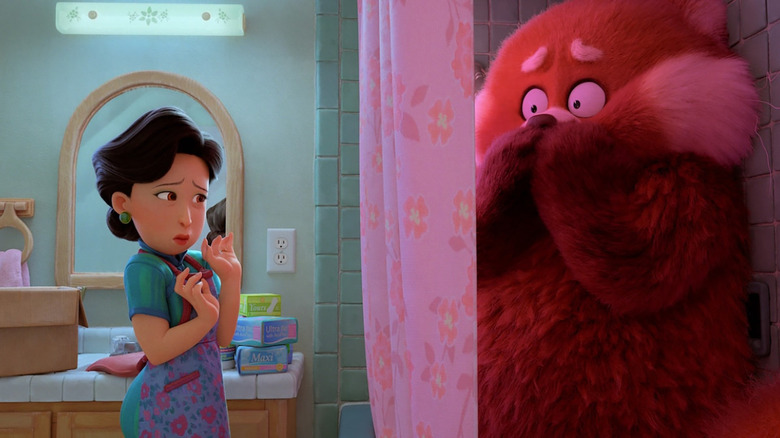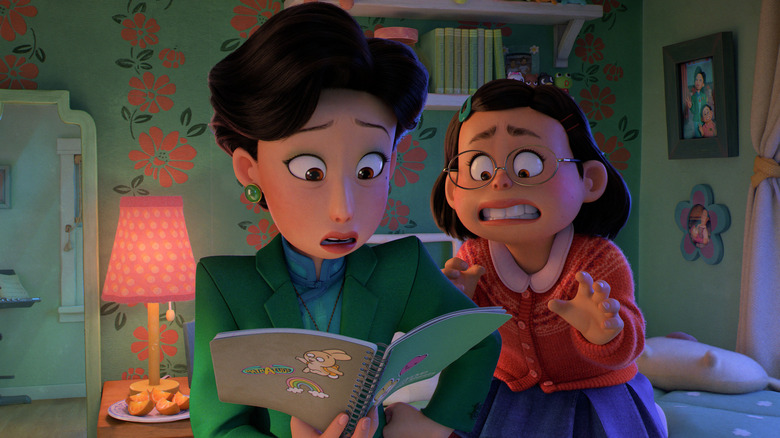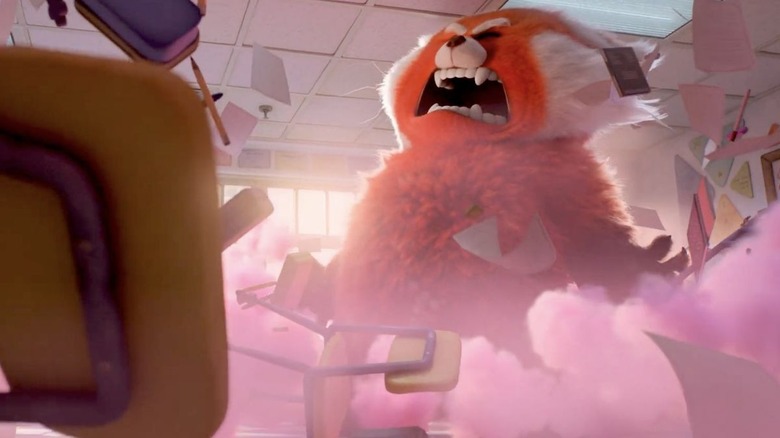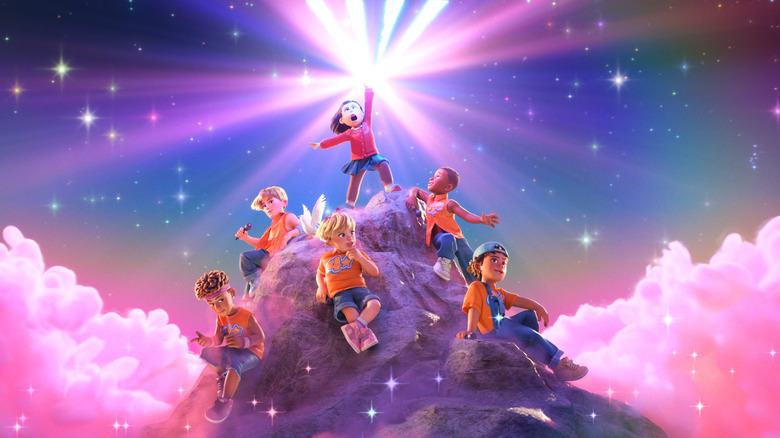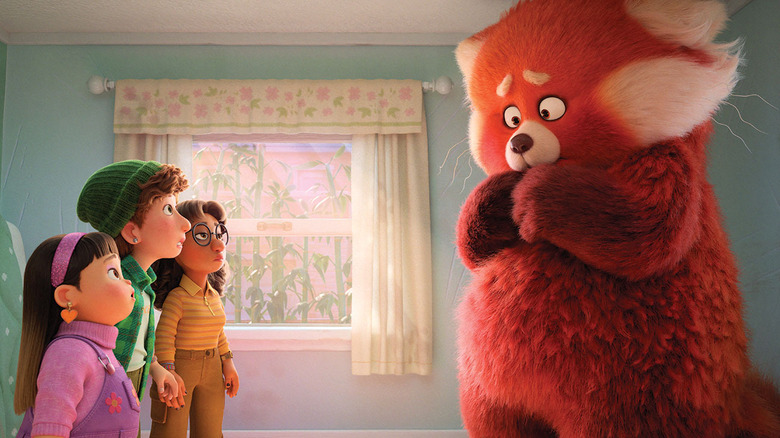Turning Red Director Domee Shi And Producer Lindsey Collins Talk Parent/Child Dynamics, Anime, And Making Pixar History [Interview]
The buzz surrounding the upcoming release of Pixar's "Turning Red" has been overwhelmingly positive, and with good reason. The 2000s-set coming-of-age story about a teen girl who discovers she poofs into a giant red panda whenever her emotions get too big to process is one of the best Pixar films in years, and offers an important message of empathy and understanding for both parents and their children.
About a month ago, I spoke with director Domee Shi and producer Lindsey Collins about "Turning Red" and healing our inner 13-year-old. Now, the dynamic duo has sat down with us once again, this time to talk about the relationship between mothers and teenagers, the historic all-female leadership team, pubescent smut drawings, and Domee gives us a little bit of anime homework.
'Imagination stops at the waist'
I was so struck by how beautifully the film tackles dealing with the inherited traits and anxieties that we get from our parents. Domee, did working on this film help you re-contextualize your own relationship with your mother? And Lindsey, did this help you re-contextualize how you act yourself as a mother?
Shi: Yeah, definitely. I think one of the biggest challenges in making the movie was writing the ending, because I don't think I had figured out, at the time, the resolution between me and my mom yet. I think in making the movie and understanding Ming and where she was coming from as a mom, and understanding why she was so overprotective, it really helped me understand my own mother and our relationship better too. That was something that came late in the game — that last piece that Mei had to learn in order to fully grow up–is the revelation that her mom is human and was just like her at some point in her life.
Collins: I think if anything, it's such a great reminder of just forcing you to be like, "Oh right, what was I like when I was 13 or 14?" As a parent of kids that age, you realize that you weren't that different, if not worse, than how they are being. At that age, what you're going through feels like you're not necessarily in control. You're just frustrated all the time and you feel really alone. I think it's always a good reminder as a parent to be like "Oh, right, it is a struggle on that side." Sometimes it just feels like a battle and you forget the struggle. So, yeah. Absolutely. It did.
Given the early 2000s setting, I know that vampires and werewolves hadn't fully gotten a stranglehold on culture yet, so I gotta ask ... why of all fantastical creatures does Mei choose to draw mermen?
Shi: I felt like at the time, me and all my friends had a mermaid phase, maybe because of "The Little Mermaid," but it just felt like such a funny and specific thing for Mei to be obsessed with. We know the trope of girls being into horses and unicorns and all that stuff, but I hadn't seen the merman yet in a movie or a TV show and it very much was a thing when you were a kid. Also, in my head too, I like to imagine that innocent Mei, like her imagination —
Collins: Imagination stops at the waist.
Shi: Yeah! It just felt like a safer, more beautiful fantasy if the man was just like, half fish. And maybe like me growing up, I had trouble drawing feet too. So I think for her, it was just easier.
Collins: Much easier, like a tail, a tail's easier.
Shi: Easier, safer, sleeker.
'You stumble your way through it'
I fully, audibly, cracked up the first time you got that reveal. The merman is great. So this next question is for Lindsey. The script takes some pretty bold and definitely welcome swings by tackling topics of puberty. At one point you hear Sandra Oh as Ming talk about "keeping petals clean" and I thought I was going to fall out of my chair.
Collins: Bless. I know.
Did you have any producer worries about how audiences may react to these very real and yet somehow still taboo topics?
Collins: No, not really. I think I was laughing too. I thought it was always handled with so much of a sweetness to it, or like an innocence to it. It is a mom struggling, trying to be a good mom in that moment of like, "Let's talk about it." Knowing full well, she doesn't want to talk about it. The daughter doesn't want to talk about it, nobody wants to talk about it. The dad is backed out of the room, wanting no part of it. And I think that fumbling is because, as much as you're like, "Oh, hey, yeah, I'm going to be more evolved, I'm going to talk about it with great sensitivity, and a matter-of-factness," you stumble your way through it. "I don't want to make this worse. I'm just trying to make it better." And invariably you stumble into it and make it totally worse by trying to be delicate with it. So I just thought it had so much truth to it that I was like, "There's no way that an audience is going to see this as inappropriate." It's such an honest and funny portrayal of a moment that we've all gone through at least once, if not twice, or once on either side.
Domee Shi's anime homework
Wonderful. So, to shift gears, I loved seeing all of the anime influences incorporated in the animation style. It just fits so perfectly in the world. Domee, if you could give the audience anime homework, what should they be watching?
Collins: She likes to give people homework.
Shi: I like to give people homework, especially anime homework. I gave [Collins] a lot of homework.
Collins: You did.
Shi: Yeah. So we take a lot of inspiration from 1990s and early 2000s anime. "Ranma ½" is a great anime to watch. It's like martial arts, high school drama, transformation, comedy, action, and slapstick. We borrowed a lot of its tone and the whole transforming between human and animal aspect. Another great transformation anime is "Fruits Basket." I loved that series growing up. It's about a girl who meets these cute boys who transform into animals when she hugs them and then they transform back into humans, but they're naked and it's comedy. It's comedy, it's high school, it's great. And then another great anime is of course, "Sailor Moon." We took a lot of inspiration from the color palette, but also the girl friendship that you see in the movie is very much an homage to "Sailor Moon." Middle school girls saving the world with superpowers, how can you go wrong with that? I could go on, but those are three to watch for sure.
'Redefine what a universal story can look and feel like'
Beautiful suggestions! I love it! So my last question for you both is, what about "Turning Red" has brought you the greatest sense of pride?
Collins: Wow. Good question.
Shi: Good question.
Collins: I think it all came rushing in the moment we were able to finally show the movie when it was finished to the crew. We traditionally do that, but obviously, it's been a funky couple of years, so we weren't even sure we were going to be able to bring the crew together. And so we found this outdoor amphitheater in November in Northern California. It was cold but everybody was able to sit outside and we had a huge screen brought in, and 99% of the crew had not seen one frame of this movie on a big screen since we'd been making it from home. So it was a bit nerve-wracking. There [were] 2,000 people there, because they all brought a family member or a friend, and traditionally, the leadership of the crew comes up and stands on stage to say thank you and welcome to everybody. There were five of us that stood up there and we had this moment where we just looked around and realized that we were all women and it was a first. And just standing up there realizing that, and then hearing the crowd, which is all the people we work with and love and had worked on this film with us. You could feel the collective pride, not only in the movie but in the fact that we were representing a first for Pixar. So it was pretty special.
Shi: Yeah, that was awesome. You took my answer, but another point of pride for me is just ... the whole movie I'm so proud of, but having people on the crew, and an audience who have never been a 13-year-old, awkward Chinese-Canadian girl, just come up — like, grown-ass men being like, "Oh my gosh, it was such a funny, relatable, story!" I couldn't have imagined that going in. People are surprised at how relatable it is, even though it's so specific–it's culturally specific, time period specific. But I really feel proud that we were able to redefine what a universal story can look and feel like.
"Turning Red" will be available for streaming on March 11, 2022, on Disney+.
